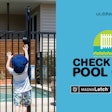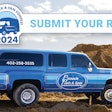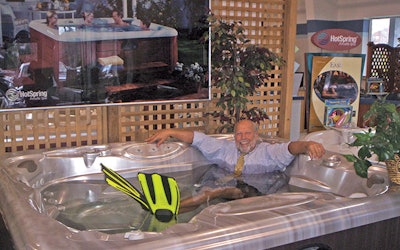
By the NumbersA study has found ESOPs appear to increase sales, employment and sales per employee by about 2.3 to 2.4 percent.* * Source: Joseph Blasi, Douglas Kruse, and Dan Weltman, "Firm Survival and Performance in Privately-Held ESOP Companies," 2013 |
Jim Van Fleet has owned Mainely Tubs (Scarborough, Maine) for 25 years. Today, he's still an owner — he's just not the only one. Now he owns Mainely Tubs with his 39 employees, an agreement made when Van Fleet decided to move his company into an employee stock ownership model, or ESOP.
For those unfamiliar with the concept, an ESOP is a benefit program in which employees earn shares of the company for which they work. Similar to a 401K, an ESOP is primarily a way to fund retirement (and both adhere to many of the same regulations, making them somewhat sisters), but for longtime industry veterans like Van Fleet, it also offers clear path to retirement.
RELATED: Thinking About Buying the Family Business? Read This First
"When I did this transaction, I was 68 years old. I'm now 69," he says. "…I'm older than people should be when they start to think about exiting. So bad on me for waiting for so long, but there were a lot of other very good reasons to have done this, and the result is something about which I'm thrilled."
At the top of the list, he says, was rewarding the people who work for him and making Mainely Tubs an enticing workplace for future employees.
"I did it because I wanted to retain employees, I wanted to attract new and better candidates for employment, I wanted continuity with my customers — I have over 21,000 — and I wanted to share the wealth with those people who had made the company valuable. I have egalitarian instincts in me, so I like to share," he says with a laugh.
Here, Van Fleet explains how his ESOP works and what it was like to establish the plan.
In a Nutshell
At Mainely Tubs, employees are eligible to receive stock after their first year with the company. Each employee receives annual shares based on a percentage of his/her compensation in relation to the whole of compensation for each year (or the total payroll). The shares are vested over a period of time as determined by the company; at Mainely Tubs, it's six years.
For example, if total payroll is $2 million for any particular year, and you have an employee making $100,000, then that employee will get 5 percent of the stock allocated that year.
Most companies opt to have 100 percent of the stock allocated over 20 to 30 years. By the time all stock is distributed, some employee retirements will be underway. Upon retirement, the company buys back the departing employee's stock, making it available again for allocation to newer employees.
If employees leave for another company, what they receive depends on how long they stayed with the company. Since Mainely Tubs' vesting period is six years, an employee with a five-year tenure would get 5/6ths of their stock value. Someone employed for 10 years, for example, would get his/her fully vested payment, generally paid out over a period of two to four years.
Groundwork
According to the National Center for Employee Ownership's most current data, there are about 6,717 ESOPs in the country, which account for more than 10.5 million active participants. Only 300 to 400 ESOPs form each year, making them relatively uncommon in the business world — and especially so in the hot tub industry.
While they offer plenty of benefits for both companies and the employees who work for them, ESOPs are scarce largely because interested businesses must first meet several qualifications.
"You need to be a certain size in order to consider an ESOP in the first place, so it's not suitable for very small companies," Van Fleet says. "In fact, in my study, I found experts in our field who say you have to have approximately a half a million dollar payroll, including the owner, to qualify. And there are people who say you need at least 15 to 20 employees, that you have to have a free cash flow of at least $40,000 a year and a balance sheet with minimal debt."
And naturally, since you need a valuation to determine the worth of your company and the stock, companies considering an ESOP need to have a strong record of profitability. Mainely Tubs, for example, broke $10 million in revenue last year.
RELATED: How to Pass Down the Family Business
Profitability alone, however, isn't everything. A spotless financial history of strict revenue reporting is equally important, along with carefully calculated projections of the company's success, which are used to attract financial partners. Simply put, an ESOP does not happen overnight.
"I think the preparation for an ESOP is a three to five year process," Van Fleet says. "And it really requires becoming rigorous in the way you manage your business financially."
And, of course, it's not cheap to establish an ESOP, either.
"As the selling shareholder, I hire a valuation company, I hire an attorney, and I negotiate with a trustee team that represents all of the employees in the hope of arriving at a transaction value and transaction terms that are suitable to both parties," he says. "And that process, if successful, gets you an independent valuation in the eyes of the U.S. Department of Labor. And ultimately, it is the DOL that audits and ensures that there is compliance with both tax laws and ESOP regulations.
"So it is expensive to do this, and by that I would say it's rare that an ESOP transaction at the front end costs less than $100,000. But I would say it's also rare to see it go over $250,000."
So Why Not Sell Outright?
Given the work, expense and time required to set up an ESOP, one big question remains: Why do this at all when you can just sell and walk away?
While that is a valid option, Van Fleet's objective was to get the fair market value for his business — an unlikely outcome when selling to a private buyer.
"Most private buyers want to buy something at a fixer-upper price and then sell it at a premium price," he says.
While the ESOP process can be expensive, Van Fleet found that when compared to the fees of a private sale, he came out ahead.
"I found that [the ESOP process] was far less expensive than a mergers and acquisitions firm, or far less than a business broker, were they to have handled the private sale of my company. So I think that while the process was expensive, time consuming, laborious, I got a fair deal," he says.
And more critically to Van Fleet, a private purchase could put his employees employment status in jeopardy. "The closer [the buyer] gets to fair market value, the more vulnerable everybody on the payroll becomes, because there has to be a way for them to pay for the business," he says. "The history of private sales are that the most vulnerable expense of the acquisition is the payroll, because it's also generally the biggest expense other than cost of goods sold. So in private sales, it is very common for people to lose their jobs. And I wanted nothing to do with that."
Even if everything went well in a private sale and the employees stayed on, new ownership can rattle the ranks. At Mainely Tubs, company culture is an important facet of everyday life, and as such, it was imperative for Van Fleet to keep things as undisturbed as possible during the transition.
"You can't let the company culture change so much at the transaction that it upsets the apple cart," he says.
Finally, there's the matter of leaving the industry. Van Fleet may be 69, yet like many fellow business owners in the spa industry, it's hard to simply wash your hands of the job. Most private sales would require it. The ESOP, however, provides a smoother transition.
"I have a three-year employment contract, because part of the bank's covenant was that they wanted me to continue to be involved. And I'm really happy about that because I couldn't walk away from my business cold turkey. It's kind of like my third child," he says.
While the ESOP route isn't for everyone, Van Fleet finds the setup reflects the values he thinks helped Mainely Tubs become so successful in the first place: an employee-focused culture, financial incentives for good work, superb customer service and the desire to do better each and every day.
"This was the best way that I knew to share with everybody the rising future value of the company," he says.
Comments or thoughts on this article? Please e-mail [email protected].

























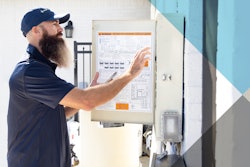
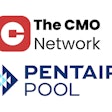
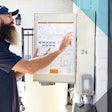
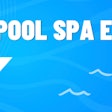
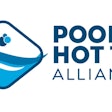
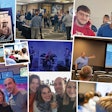

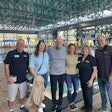
![IPSSA’s incoming President Michael Denham [left], Rose Smoot, IPSSA Executive Director [center] and the outgoing President, Todd Starner [right].](https://img.aquamagazine.com/files/base/abmedia/all/image/2024/04/New_IncomingPres_MikeDenham_RoseSmoot_outgoing_president_ToddStarner_IMG_3920_copy.662682e0cbd3a.png?auto=format%2Ccompress&fit=crop&h=112&q=70&rect=0%2C345%2C3024%2C1701&w=112)

